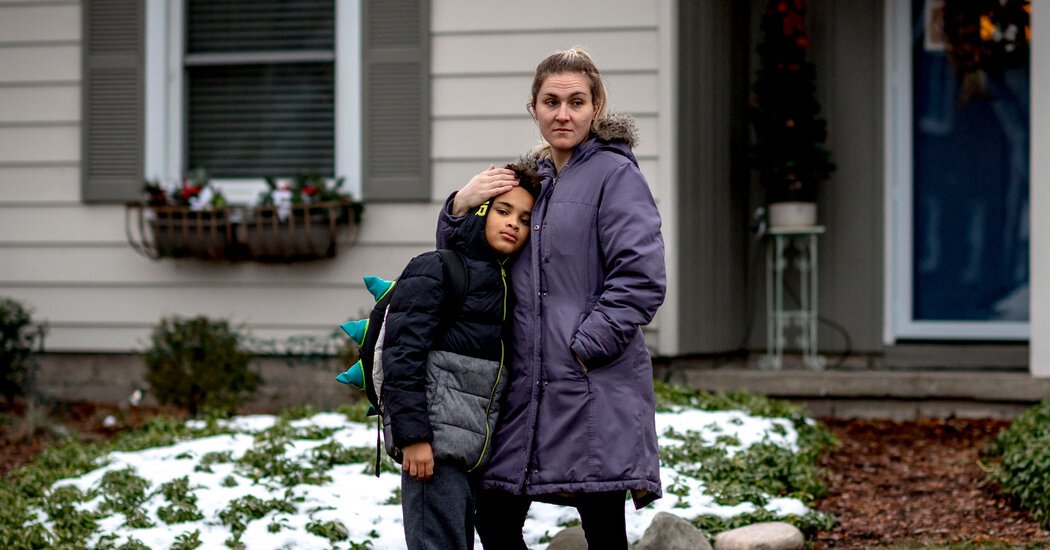
DETROIT — Caitlin Reynolds, a single mother, was happy that her son, L.J., was finally settled into fourth grade after a rocky experience last year with remote learning.
Then, on Wednesday, Nov. 17, an announcement: Detroit public schools would close their classrooms every Friday in December. There would be virtual school only.
On Friday, a follow-up announcement: School was also canceled starting that Monday, for the entire week of Thanksgiving. This time, there would be no online option.
“You need to take the kids back out again?” Ms. Reynolds said. “How is that not going to be harmful to these students?”
After a few months of relative calm, some public schools are going remote — or canceling classes entirely — for a day a week, or even for a couple of weeks, because of teacher burnout or staff shortages.
At least six other school districts in Michigan extended Thanksgiving break, and three districts in Washington State, including Seattle Public Schools, unexpectedly closed on Nov. 12, the day after Veterans Day. In one instance, Brevard Public Schools in Florida used leftover “hurricane days” to close schools for the entire week of Thanksgiving.
In Utah, the Canyons School District announced that all of its schools would go remote one Friday a month from November until March, equivalent to more than a week of school.
A few of these districts have closed with very little notice, sending parents to find child care, as well as summon the wherewithal to supervise remote learning. Beyond the logistics, many parents are worried that with additional lost days of in-person school, their children will fall further behind.
School districts cited various reasons for the temporary closings, from a rise in Covid-19 cases to a need to thoroughly sanitize classrooms. But for many schools, the remote learning days — an option that did not exist before the pandemic — are a last-ditch effort to keep teachers from resigning. They are burned out, educators said, after a year of trying to help students through learning loss, and working overtime to make up for labor shortages.
Battles in the classroom — from mask mandates to debates over critical race theory — have also taken a toll, said Randi Weingarten, the president of the American Federation of Teachers, the country’s second-biggest teachers’ union.
“What you hear from teachers is that it’s been too much,” she said. “And they’re trying the best that they can.”
These temporary closures, though, may only hamper relationships with parents at a moment when tensions in many districts are already high.
Because of school cancellations last academic year, Ms. Reynolds, who works at a University of Michigan research lab, had already run out of paid time off. Her mother was able to watch her fourth-grade son last Friday. But now she is trying to make sure someone else can be home with him every Friday this month — or lose hundreds of dollars from her paycheck.
School fights and other outbursts from students led district leaders at Reynolds Middle School, in Fairview, Ore., just east of Portland, to cancel classes from Nov. 18 until Dec. 7. They gave parents two days’ notice.
“Are you kidding me?” said Missy Kisselman, the mother of Sophia, an eighth grader there. “I mean, are you kidding me?”
Ms. Kisselman, who is working out of her living room as a county case manager, said it was “nearly impossible” for her to help Sophia, who has attention deficit hyperactivity disorder, with her schoolwork.
“I feel like, if this school knew that they were already understaffed starting this school year, it should have just stayed online,” Ms. Kisselman said.
Steven Padilla, a district spokesman, said the school was using this time to reflect on its safety protocols to “ensure that we will not have to return to short-term distance learning” in the future.
In Portland, Ore., the teachers’ union is proposing early-release days for some of its schools after they return from winter break.
Elizabeth Thiel, president of the Portland Association of Teachers, says her union is receiving an “alarming” number of inquiries from teachers asking for help resigning. If the union can figure out a plan now, she says, that may help avoid mass resignations, which would force schools to go entirely remote.
“It is far better for our students and families to be able to plan on an inconvenience like that, than it would be for the whole system to stop functioning,” Ms. Thiel said.
In Southfield, outside of Detroit, the school district alerted parents on Oct. 31, a Sunday, that it would go remote that Friday — and then every Friday until February. Kristina Morgan, whose daughter is an eighth grader at University Middle School Academy, said she found out through social media.
A single mother who works for the Wayne County court system, Ms. Morgan now spends the beginning of every week asking family members to watch her daughter, Kennedy. If she cannot find anyone, she will take the day off from work — which she says reflects poorly at the office, and makes her feel like a burden to her family.
The Coronavirus Pandemic: Key Things to Know
“It’s very difficult already being a single parent, period,” she said. “But when you have your life figured out based on your child being in school during certain hours — and when I have to scramble to find child care outside of those hours, or to ask around — it’s frustrating.”
Ms. Morgan could leave her teenage daughter at home alone but was worried that she would get distracted by her phone or the internet instead of paying attention to school.
Research shows that disruptions during the pandemic led to students falling behind in math and reading, and students who were most affected by the crisis were already behind. Ms. Reynolds, the single mother from Detroit, said her son, once a straight-A math student, tested two grade levels behind when he returned to the classroom this year.
Last Friday, Theo Eggebrecht, 17, a senior in the arts track at Cass Technical High School in Detroit, did not have any at-home supplies for two of his arts classes that day. He said his science teacher did not show up for online class.
Instead, Theo spent several hours doing chores, petting his cat and scrolling through TikTok.
“I’m a senior, this is one of my last years of education,” he said. “It’s nerve-racking to miss out on that.”
Schools have not yet reached winter break, but many teachers are already burned out. It seems that many parents and students are as well.
Ms. Kisselman recalls the moment her daughter asked for help with an assignment.
“She was just in and out of the living room because her anxiety level was so high,” Ms. Kisselman said. “She’s like ‘What am I supposed to do? How am I supposed to learn on my own?’”
Ms. Kisselman did not have an answer.
“I finally just looked at her and said, ‘Just don’t do anything today,’” Ms. Kisselman said. “Just go into the bedroom, and just do whatever, but don’t mess with school today.”







